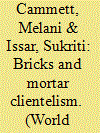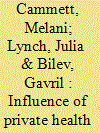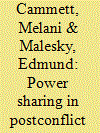|
|
|
Sort Order |
|
|
|
Items / Page
|
|
|
|
|
|
|
| Srl | Item |
| 1 |
ID:
097900


|
|
|
|
|
| Publication |
2010.
|
| Summary/Abstract |
In plural societies, social welfare can be a terrain of political contestation, particularly when public welfare functions are underdeveloped and ethnic or religious groups provide basic social services. It is well established that such organizations favor in-group members, but under what conditions do they serve out-group communities? To address this question, the authors compare the welfare programs of the predominantly Sunni Muslim Future Movement and the Shia Muslim Hezbollah in Lebanon. Although they operate under the same institutional rules and economic contexts and boast the largest welfare programs in their respective communities, the Future Movement aims to serve a broader array of beneficiaries, including non-Sunnis, whereas Hezbollah focuses more exclusively on Shia communities. Based on analyses of an original data set of the spatial locations of welfare agencies, qualitative data from interviews with providers and beneficiaries, and case studies of areas where the two parties established and did not establish welfare agencies, the authors argue that distinct political mobilization strategies-whether electoral or nonelectoral-explain different patterns of service delivery across the two organizations.
|
|
|
|
|
|
|
|
|
|
|
|
|
|
|
|
| 2 |
ID:
186810


|
|
|
|
|
| Summary/Abstract |
A core function of contemporary states is to ensure the security of their citizens. Yet in many post-conflict settings, non-state actors provide security alongside the state, typically prioritizing their own ascriptive groups and potentially undercutting a sense of national political community. When do citizens prefer group-specific versus national security? While most studies focus on individual psychological factors, we argue that group-level characteristics also shape political preferences. Based on a conjoint experiment in Lebanon, we explore the relative appeal of group-specific versus national pledges to assure protection. We find that respondents view national security provision quite positively, while members of communities with stronger group-specific security simultaneously favor private provision. Individuals with closer ties to credible group security providers are also more likely to prefer those services. Citizens therefore do not see a clear trade-off between private and public protection, while group-specific legacies mediate heterogeneity in support for pluralist security provision.
|
|
|
|
|
|
|
|
|
|
|
|
|
|
|
|
| 3 |
ID:
142733


|
|
|
|
|
| Summary/Abstract |
Using individual-level data from the 2008 European Social Survey and country-level health care financing data we analyze the influence of private financing of health care on political trust in twenty-five European countries. Net of known predictors of trust at the individual and country level, we find that trust in government is significantly lower where the health system is financed to a greater degree by private sources. This negative relationship occurs because in countries with more private financing, low-income citizens perceive themselves to be at greater risk for not receiving needed health care. This perception of risk is associated with more negative evaluations of the performance of the health care system, which in turn is associated with less trust in government. When states do less to ensure the basic health care needs of members of society who are at greatest risk, these citizens may come to place less trust in government institutions. Hence, the increasing pressure on European governments to privatize the financing of health care in the wake of the financial crisis that is also characterized by growing income inequality threatens to make citizens trust government less. At the same time, implementation of the Affordable Care Act could signal a renaissance for political trust in the United States, if a growing role in the health care system is accompanied by a redistribution of risk.
|
|
|
|
|
|
|
|
|
|
|
|
|
|
|
|
| 4 |
ID:
115727


|
|
|
|
|
| Publication |
2012.
|
| Summary/Abstract |
Which components of power sharing contribute to the duration of peace and what explains the linkages between institutional design and stability? The authors argue that certain types of political power sharing are associated with more durable peace than others, primarily through their positive effects on governance and public service delivery. In particular, closed-list proportional representation (PR) electoral systems stand out among power-sharing arrangements, due to their ability to deliver superior governance outcomes which, in turn, can promote stability by undercutting the initial motivations for conflict or by reducing the feasibility of rebellion. The authors argue that these positive outcomes result from closed-list PR's ability to increase party discipline and checks on executive power, while reducing incentives for personalistic voting. The introduction of political institutions in postconflict negotiated settlements allows us to test the independent effects of institutions on governance and stability using survival analysis and a case study.
|
|
|
|
|
|
|
|
|
|
|
|
|
|
|
|
|
|
|
|
|